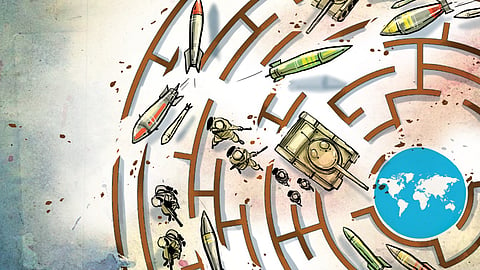

One hundred days into Israel’s attack on the Palestinian enclave of Gaza, the geopolitics of the West Asian region has changed beyond recognition. The colossal destruction of Gaza and the horrific loss of innocent lives exposes Israel to condemnation of being an apartheid state committing genocide. The integration of Israel into the region under these circumstances will remain a pipe dream for the foreseeable future and the probability of the Arab-Israeli conflict transforming as an open-ended war of attrition is looming large.
The intra-regional alignments have come unstuck overnight and a great fluidity has appeared in regional security and stability, which will impact other regions, including India. In fact, the cascading developments have already left a mark on Indian interests. The Palestinian resistance groups known as the Islamic Resistance in Iraq, which is targeting the illegal military bases of the US in Iraq, has in recent weeks, expanded its operation to strike Israeli territories.
In its latest statement, the Islamic State in Iraq announced that it has struck a “vital target, deep inside the Israeli-occupied territories” with a long-range cruise missile “in solidarity with the Palestinian resistance and people of Gaza against the Zionist aggression” and furthermore, vowed to continue striking “the enemy’s strongholds” with more operations in the next phase.
The Iranian media has since reported that the target struck was an oil refinery in Haifa Bay in northern Israel. Apparently, this was the second such operation. The spokesman of the Palestinian resistance group Hamas, Abu Ubaida, disclosed in a television address on Sunday that the various resistance fronts (such as Lebanon’s Hezbollah, Yemen’s Ansarullah and the Islamic Resistance in Iraq) “will expand their strikes on the Zionist enemy in the coming days.” Indeed, the scale and sophistication of the attacks on the US military bases in the region is steadily improving, too. A devastating ballistic missile attack on the Ain al-Assad base in central Iraq last week left several US soldiers injured with brain injuries. The surge in attacks on the US bases aims to force the withdrawal of US troops—around 2500 soldiers in Iraq and 900 in Syria—which, the resistance believes, will disorient the Israeli military.
No doubt, striking a vital and sensitive target such as Haifa is a major development. Haifa is home to sensitive facilities, including a seaport, airport and three power plants. Haifa port, run by an Indian corporate group, has the potential to handle 90% of Israel’s foreign trade. Besides, the Polonium naval base located nearby not only hosts Israeli missiles with nuclear warheads but also submarines. Washington and Tel Aviv have big plans for Haifa as a key point in the proposed India-Middle East-Europe-Economic Corridor.
So, the writing is on the wall: The Axis of Resistance has Haifa port in its crosshairs, India’s biggest strategic asset in the entire Middle East. And the resistance groups will render Haifa port dysfunctional so long as the Palestine problem remains unresolved. Hezbollah has already forced the eviction of Jewish settlers from northern Israel whom they regard as “colonisers”.
However, the resolution of the Palestinian problem remains elusive so long as Israeli intransigence continues vis-a-vis a two-state solution. And Israelis will not compromise, either, on their cherished dream of establishing a Zionist state—not even under American pressure. What complicates these diplomatic strains is also that President Biden has his own political considerations during an election year in the US, as he navigates the divisive foreign policy crisis, while Prime Minister Netanyahu also remains unyielding, as for remaining in power, this war must continue, influenced by far-right elements in his coalition.
Meanwhile, there is a highly surcharged atmosphere in the Arab Street and common perceptions may come to affect regional attitudes toward India. Actual realities notwithstanding, there is a misperception that India is at the Zionist state’s bidding, which is of course highly damaging to Indian interests, especially as the ongoing re-alignments in the power dynamic are fast crystallising in a certain direction anchored on the strategic autonomy of regional states, which resents western dominance.
Indian diplomacy was transfixed on the old paradigm of Saudi Arabia coming on board the Abraham Accords to put Israel as the regional satrap and isolate Iran whilst the US focused on Asia-Pacific. Delhi expected, rightly so, that it would be a major beneficiary of the US-Israeli game plan. But then, as the proverb goes, if wishes were horses, beggars would ride.
A reality check is needed. The Iranian news agency IRNA reported that the eleventh meeting of the Joint Committee on Iran-Pakistan border trade recently took place in Chabahar port, highlighting that Iran is ‘fully prepared’ for the development of trade and investment with Pakistan in Chabahar port. A senior Iranian official told the Pakistani delegation that Chabahar port is “the golden gateway of transit to the CIS countries and Afghanistan”, with its strategic location in the northern Indian Ocean and the easternmost point of Makran coast.
To be sure, the recent pantomime of missile strikes at each other, which had the appearance of a rift between Iran and Pakistan, remains a riddle wrapped in a mystery. The ancient Chinese philosopher Lao Tsu once said, ‘Those who know do not speak. Those who speak do not know.’ Certainly, Biden didn’t know when he offered help to Pakistan to push back Iranians. A charitable explanation would be that Iran, with some silent help from China and Russia, rescued Pakistan in the nick of time from entrapment in the US shenanigans to ‘return’ to Afghanistan.
Russia will be holding consultations shortly with Pakistan, Iran and China. This dizzying spectacle of smoke and mirrors illuminates the mystique of what American strategists call the Greater Middle East—a single geo-strategic entity on the chessboard comprising the Arab world plus Iran, Pakistan and Afghanistan—encircling the ‘heartland’ of Russia in pivot of history.
(Views are personal)
M K Bhadrakumar, Former diplomat